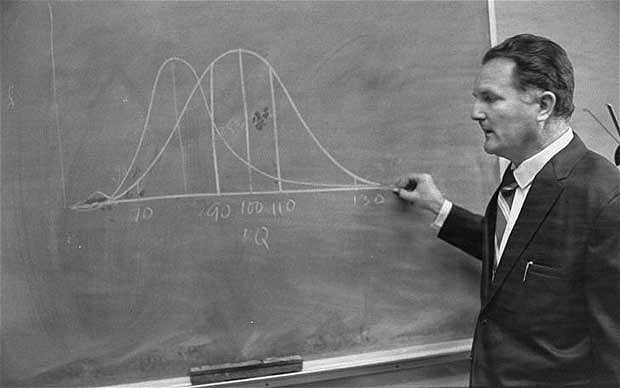Arthur Jensen
Telegraph (London), January 1, 2013
Arthur Jensen, who has died aged 89, was an American educational psychologist who in 1969 ignited a fierce debate by identifying a relationship between race and intelligence.
In February that year Jensen published a 123-page paper, How Much Can We Boost IQ and Scholastic Achievement?, in the Harvard Education Review, claiming to present evidence that racial differences in intelligence test scores might be genetically determined.
Coming as it did during a time of political and social turmoil in the United States, this assertion — together with his recommendation that white and African-American children might benefit from different types of education — enraged many members of the academic community and the public at large. It was a controversy from which Jensen never fully freed himself, despite a long career which saw him lauded as one of the most eminent educational psychologists of his day.
Ironically enough, it was as a professor at the University of California, Berkeley — in the 1960s a hotbed of American student radicalism — that Jensen produced the work that came to enrage liberal opinion. In the early part of the decade he devised intelligence tests for black, Hispanic and other minority-group children which led to his drawing a distinction between Level I abilities, or “associative learning” (essentially the ability to memorise facts or skills), and Level II, or “conceptual learning” (the ability to solve problems).
Jensen concluded that Level I abilities were evenly distributed across racial boundaries, but that whites were better endowed at Level II (with Asians even more gifted). He went on to propose that 80 per cent of a person’s intelligence was genetically determined, with only 20 per cent due to environment. He was careful to state, however, that the range of intelligence is the same in all races, the differences appearing in the norms.
His denials that he was a racist did nothing to dampen the outcry that greeted the publication of his paper in the Harvard Education Review. His lectures were disrupted, his effigy burned by university students, and he was ostracised by some of his colleagues. For a time he was forced to employ bodyguards. In its next issue, the Review published rebuttals by no fewer than six scholars.
Arthur Robert Jensen was born on August 24 1923 in San Diego, California, where his father ran a building materials company. At Herbert Hoover High School in San Diego, Arthur played the clarinet, making occasional appearances with the local symphony orchestra; his early ambition was to be a conductor. He went on to study Psychology, Physiology and Biology at Berkeley, graduating in 1945.
After working as a teacher at his old school, in 1952 he completed a PhD in Psychology at Columbia, followed by a clinical internship at Maryland University’s Psychiatric Institute. He then secured a post in the laboratory of Professor Hans Eysenck at the Maudsley Hospital in London, where he worked from 1956 to 1958 and first investigated individual learning differences. He later said: “Nearly all my work since then has directly or indirectly grown out of the kind of problems I became involved with during this period.” (Eysenck — himself no stranger to controversy — later supported Jensen’s views on the role of genetics in intelligence, and was punched in the nose by a female protester at the London School of Economics.)
Jensen joined the educational psychology department at Berkeley in 1958, and three years later was one of the co-founders of its Institute of Learning. In 1966 he was appointed the Institute’s professor of educational psychology, pursuing his interest in the cultural and genetic determinants of intelligence and learning ability, particularly in children who were culturally disadvantaged.
Although controversy continued to surround him (the evolutionary biologist Stephen Jay Gould was among his sternest critics), Jensen did not recant his views, and claimed that his work had been misunderstood, declaring in 1981: “Nowhere have I ‘claimed’ an ‘innate deficiency’ of intelligence in blacks . . . The plain fact is that at present there exists no scientifically satisfactory explanation for the differences between the IQ distributions in the black and white populations. The only genuine consensus among well-informed scientists on this topic is that the cause of the difference remains an open question.” Today many in the field believe that Jensen was right to resurrect the idea of inherited general intelligence, although they would not argue that there is a racial dimension.
Jensen continued to teach at Berkeley until his retirement in 1994. In 2003 he was awarded the Kistler Prize for original contributions to the understanding of the connection between the human genome and human society; and in 2006 the International Society for Intelligence Research presented him with its Lifetime Achievement Award.
Among his books are Genetics and Education (1972); Educability and Group Differences (1973); Bias in Mental Testing (1979); The g Factor: The Science of Mental Ability (1998); and Clocking the Mind: Mental Chronometry and Individual Differences (2006).
He married, in 1960, Barbara Jane DeLarme; she died in 2007, and he is survived by their daughter.
















